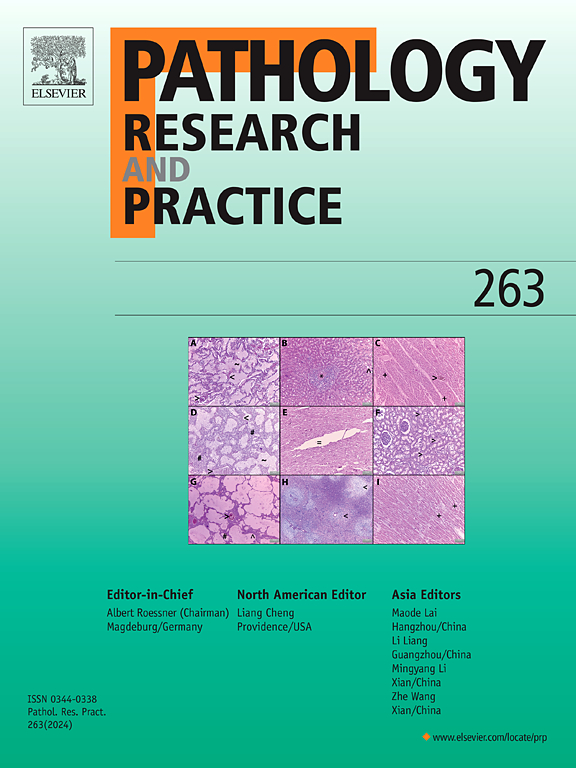Lysine demethylases and cancer
IF 2.9
4区 医学
Q2 PATHOLOGY
引用次数: 0
Abstract
Epigenetic mechanisms are of pivotal importance in the normal development and maintenance of cell and tissue-specific gene expression patterns, and are fundamental to the genesis of cancer. One significant category of epigenetic modifications is histone methylation. Histone methylation plays a crucial role in the regulation of gene expression, and its dysregulation has been observed in various diseases, including cancer. The maintenance of the histone methylation state is dependent on two classes of enzymes: histone methyltransferases, which add methyl groups to arginine and lysine residues, and lysine demethylases, which remove methyl groups from lysine residues of histones. To date, eight subfamilies have been identified, comprising approximately 30 lysine demethylases. These enzymes are expressed differently across cells and tissues and exert a substantial impact on the development and progression of cancer. The diverse range of lysine demethylases influence a multitude of oncogenic pathways, either by promoting or inhibiting their activity. However, comprehensive data on the full spectrum expression of lysine demethylases in distinct cancer types remain scarce. Lysine demethylases have been demonstrated to play a role in drug resistance in numerous cancers. This is achieved by modulating the metabolic profile of cancer cells, enhancing the ratio of cancer stem cells, and elevating the expression of drug-tolerant genes. Additionally, they facilitate epithelial-mesenchymal transition and metastatic potential. The objective of this review is to synthesize recent data on the relationship between lysine demethylases and cancer, with a particular focus on cancer cell drug resistance.
赖氨酸去甲基化酶和癌症
表观遗传机制在细胞和组织特异性基因表达模式的正常发育和维持中起着至关重要的作用,也是癌症发生的基础。表观遗传修饰的一个重要类别是组蛋白甲基化。组蛋白甲基化在基因表达调控中起着至关重要的作用,在包括癌症在内的多种疾病中都观察到其失调。组蛋白甲基化状态的维持依赖于两类酶:组蛋白甲基转移酶,将甲基添加到精氨酸和赖氨酸残基上,赖氨酸去甲基化酶,从组蛋白的赖氨酸残基上去除甲基。迄今为止,已经确定了8个亚家族,包括大约30个赖氨酸去甲基化酶。这些酶在不同的细胞和组织中表达不同,并对癌症的发生和发展产生重大影响。不同范围的赖氨酸去甲基化酶通过促进或抑制其活性影响多种致癌途径。然而,关于赖氨酸去甲基化酶在不同癌症类型中的全谱表达的综合数据仍然很少。赖氨酸去甲基化酶已被证明在许多癌症的耐药性中起作用。这是通过调节癌细胞的代谢谱、提高癌症干细胞的比例和提高耐药基因的表达来实现的。此外,它们促进上皮-间质转化和转移潜能。本文综述了赖氨酸去甲基化酶与癌症之间关系的最新研究数据,特别关注癌细胞的耐药性。
本文章由计算机程序翻译,如有差异,请以英文原文为准。
求助全文
约1分钟内获得全文
求助全文
来源期刊
CiteScore
5.00
自引率
3.60%
发文量
405
审稿时长
24 days
期刊介绍:
Pathology, Research and Practice provides accessible coverage of the most recent developments across the entire field of pathology: Reviews focus on recent progress in pathology, while Comments look at interesting current problems and at hypotheses for future developments in pathology. Original Papers present novel findings on all aspects of general, anatomic and molecular pathology. Rapid Communications inform readers on preliminary findings that may be relevant for further studies and need to be communicated quickly. Teaching Cases look at new aspects or special diagnostic problems of diseases and at case reports relevant for the pathologist''s practice.

 求助内容:
求助内容: 应助结果提醒方式:
应助结果提醒方式:


